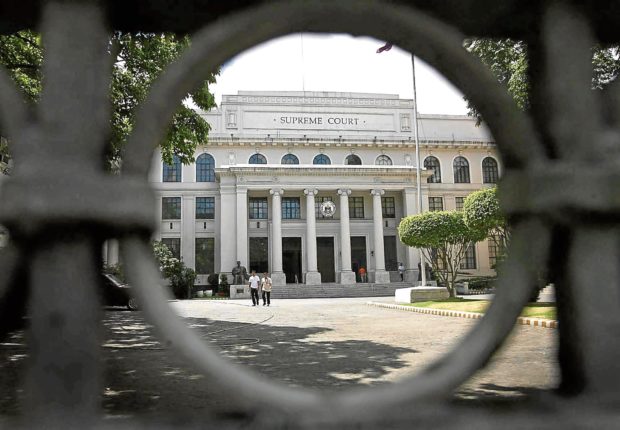
The Supreme Court building is viewed from its closed gateway. INQUIRER FILE PHOTO
MANILA, Philippines — All disputes, claims, and controversies, including tax assessments among executive agencies, should be submitted to administrative settlement by the Department of Justice (DOJ) or the Office of the Solicitor General, the Supreme Court said.
The SC’s Third Division, through Associate Justice Maria Filomena D. Singh, dismissed the petition for review filed by the Department of Energy (DOE), which seeks the reversal of the Nov. 4, 2021 ruling of the Court of Tax Appeals (CTA) denying its plea to set aside the warrants of distraint and/or levy and garnishment issued by the Bureau of Internal Revenue (BIR).
The dispute stemmed from the BIR’s 2018 demand for the DOE to pay P18.37-billion worth of deficiency excise taxes on mining-related claims involving condensates, which the DOE said is classified as natural gas that is exempt from excise taxes.
In 2019, the DOE was informed that the assessment has become final and executory and that, according to the Department of Science and Technology (DOST), condensates are separate and distinct from natural gas.
The BIR then issued a warrant of distraint and levy against the DOE. The DOE then took its case to the CTA.
But the CTA held that it has no jurisdiction over the case since it is a purely intra-governmental dispute.
The DOE then elevated the issue before the SC, asserting that the CTA erred in dismissing its petition on the ground of lack of jurisdiction.
It asserted that it is the CTA that has jurisdiction over the case as Republic Act No. 1125 (An Act Creating the Court of Tax Appeals) prevails over Presidential Decree No. 242 (Prescribing the Procedure for Administrative Settlement or Adjudication of Disputes, Claims and Controversies Between or Among Government Offices, Agencies, and Instrumentalities, Including Government-Owned and Controlled Corporations, and for Other Purposes).
It added that the CTA has the expertise and experience to resolve tax issues.
But the SC said the CTA did not make a mistake when it steered clear of the case.
“It also correctly gave precedence to the provision of P.D. No. 242, now embodied in the Revised Administrative Code, which especially deals with the resolution of disputes, claims, and controversies between departments, and carves out such disputes from the jurisdiction of the CTA, as provided in the NIRC (National Internal Revenue Code) and RA 1125,” the SC said.
“P.D. 242 should be read as an exception to the general rule set in R.A. 1125 and the NIRC that the CTA has jurisdiction over tax disputes involving laws administered by the BIR,” the SC explained.
“This is consistent with the fundamental rule that special laws prevail over general laws,” it added.
Furthermore, the SC said the president, as chief executive, has control over all government agencies, Thus, it is only proper that he first be given a chance to resolve a dispute before resorting to the courts.
“Because of such broad power vested in the President over the acts of subordinates in the Executive Department, it is not only constitutionally infirm, but likewise downright impractical, to allow the judiciary to take cognizance of a matter which can still be undone, modified, or otherwise subjected to the discretion of the Executive,” it added.
The ruling is concurred in by Associate Justices Alfredo Benjamin Caguioa and Henri Jean Paul Inting.
Associate Justices Samuel Gaerlan and Japar Dimaampao dissented from the ruling.